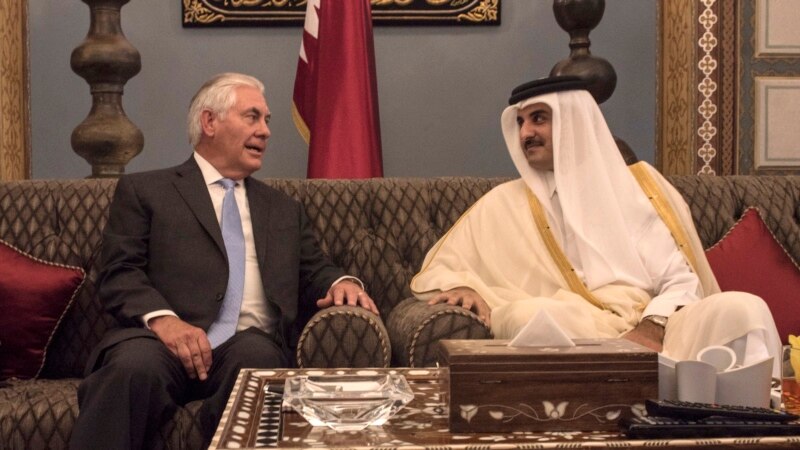Tillerson Ends Persian Gulf Trip With No Breakthrough on Qatar Blockade

U.S. Secretary of State Rex Tillerson left Qatar Thursday with little apparent progress in his shuttle diplomacy aimed at ending Doha's diplomatic standoff with four Arab countries.
Tillerson declined questions after a final meeting with Qatar's emir, Sheikh Tamim bin Hamad al-Thani, before leaving for Washington. The emir's brother, Sheikh Mohammad bin Hamad al-Thani, told Tillerson, "Hope to see you again under better circumstances."
Tillerson spoke with Qatari leaders after spending Wednesday in the Saudi Red Sea city of Jeddah meeting with diplomats from Saudi Arabia, Egypt, Bahrain and the United Arab Emirates. The Saudi-led group broke off diplomatic ties with Qatar early last month, accusing Doha of funding terrorism in the region and being too close to rival Iran. Qatar has rejected the accusations.
Over four days, Tillerson shuttled to and from meetings in Qatar, Saudi Arabia and Kuwait in an effort to broker an end to the dispute. He secured an agreement with Qatar to strengthen its counterterrorism efforts, but Saudi Arabia, Egypt, Bahrain and the UAE said that was insufficient and continued to demand that Qatar agree to a list of 13 demands.
Doha has rejected the demands, saying they would undermine its sovereignty. Among them were ultimatums that Qatar shut down its Al Jazeera news network, cut ties with Islamist groups like the Muslim Brotherhood, limit its links to Iran and expel Turkish troops from its territory.
The U.S. is concerned the dispute could hurt its military and counterterrorism operations and enhance Iran's influence in the region.
Qatar hosts the al-Udeid Air Base, the largest U.S. military base in the Middle East and hub of its fight against Islamic State in Iraq and Syria. Bahrain hosts the U.S. Navy's 5th Fleet, while U.S. surveillance planes and other aircraft fly from the UAE.
With Tillerson unable to broker a settlement, French Foreign Minister Jean-Yves Le Drian heads to the region soon to resume talks.
In breaking off diplomatic relations with Qatar, the four Arab countries imposed sanctions on Doha, closing its only land border, refusing access to their airspace and ordering their citizens to return home.
Human Rights Watch said Thursday that the boycott has led to difficult consequences.
"Hundreds of Saudis, Bahrainis, and Emiratis have been forced into the impossible situation of either disregarding their countries' orders or leaving behind their families and job," said Sarah Leah Whitson of the rights organization.
Aaron David Miller of the Washington-based Wilson Center, an adviser to both Republican and Democratic secretaries of state in Middle East negotiations, told VOA the conflict with Qatar and Saudi Arabia and its allies has been brewing for years. He says in many ways, Qatar’s open domestic policies embody Saudi Arabia’s worst fears and amount to competing views of the shape of the Middle East. He said it would be very difficult for Tillerson, or anyone else, to help broker a long-term agreement.
As Tillerson shuttled through the Gulf, rights group Amnesty International called on the top U.S. diplomatic official to not overlook the issue of human rights and advocate for the release of activists being detained in Persian Gulf states for "peacefully expressing dissent."
“While Secretary Tillerson holds talks with the leaders of Saudi Arabia and other Gulf countries, human rights defenders are in prison and face torture for speaking out against horrific abuses in the region,†said Naureen Shah, senior director of campaigns at Amnesty International USA.
“Tillerson should condemn the persecution of peaceful dissidents, many who are facing bogus national security charges. Otherwise, Tillerson risks giving Gulf governments a green light to continue ruthless crackdowns on dissent.â€

0 Response to "Tillerson Ends Persian Gulf Trip With No Breakthrough on Qatar Blockade"
Posting Komentar